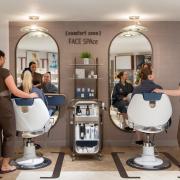If you are worried about eye cataracts take reassurance from Mike Procter, head of one of Yorkshire's leading independent opticians
Do you need a bright light to read comfortably? Do your glasses seem less clear than they used to be, despite being up to date? Are you more prone to problems with glare, especially from car headlights? If so, it could be the start of cataract. So what is cataract and are we getting cataracts earlier in life?
Cataract is a loss of transparency of the lens inside our eyes. We all lose a bit of transparency as we age but most opticians and doctors only call these natural changes ‘cataract’ if they are great enough to interfere with our day to day lives. The lens in our eyes is located behind the pupil and if it were to become totally opaque, the pupil would appear white. By this stage the person would have lost all vision in the eye. Thankfully this appearance is never seen in people of the developed world because the cataract is treated before it reaches this stage.
There is still a widely held miss-conception that cataract is a skin growing over the eye. This is wrong and refers to a different eye condition.
Treatment of cataract is straight forward. An eye surgeon replaces the blurry lens with an artificial clear one. Our grandparents had to wait for surgery until their cataracts were ‘ripe’ but these days the cataract can be replaced with an implant at any stage. Opticians and doctors tell us about our cataracts earlier than our grandparents were told because treatment can be started earlier. Age related cataract is not more common now than it was in the past.
The main constraint on timing of surgery is financial, not clinical. To be eligible for an NHS operation, your vision needs to have dropped to just better than legal driving standard. This threshold of eligibility is mediated however by your personal circumstance. In other words, how much of a problem the cataract is causing you.
What are your options if the NHS won’t pay because your vision has not yet fallen to a level that meets NHS eligibility criteria, but you want surgery to restore your full vision now? If you have private medical insurance a surgeon will need to confirm presence of significant cataract and then your insurance will normally pay; without insurance prices are from �2,000 per eye.
If you are self-funding, find out exactly what the price includes. For example, pre and post operation routine appointments, drugs, any additional non-routine appointments, further remedial surgery and investigations and so on. Consider asking your optician to phone around the private hospitals for you.
Opticians know the questions to ask the hospitals and the small fee opticians charge for the service could save you a lot of money in the long run.
What lens implants are available? NHS implants are single vision. After the operation you might need distance glasses to correct residual distance astigmatism for tasks such as driving and you will almost certainly need reading glasses.
Private implants can correct astigmatism or be of a multifocal design, correcting distance and reading. Some private hospitals offer package prices which include secondary laser surgery to fully correct any residual prescription following your cataract replacement implant.
Some people are advised against surgery, even though they have cataract. Usually this is because they have another problem with the eye which would result in vision still being blurred even after having the cataract removed. The most common co-existing problem is an untreatable form of macular degeneration.
Cataract surgery is now considered to carry very little risk. In the over 50s it is becoming the refractive surgery of choice, where the natural lens is removed before cataract is fully formed and the implant takes care of your glasses prescription.
Mike Procter is based at M Procter Opticians, 16 Parliament Street, Harrogate, HG1 2QZ 01423 562299 mprocter.co.uk


























